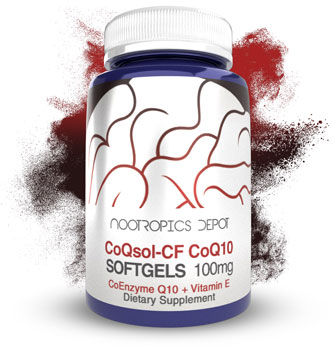CoQSol-CF CoEnzyme Q10: The Superior CoQ10 Supplement Over Grocery Store Brands
Posted by Nootropics Depot on 14th Feb 2019
What is CoQ10?
Coenzyme Q10 (also known as CoQ10) is, as the name suggests, a coenzyme. CoQ10, via its action as a coenzyme, can drive many cellular processes throughout our bodies. Although not classified as a vitamin, CoQ10 closely resembles the structure of vitamin K and it appears that CoQ10 benefits resemble vitamin-like effects. This also hints at an important aspect of CoQ10: it is essential for overall human health. Without CoQ10, many bodily functions would may not work properly. Luckily our bodies are fairly good at preserving CoQ10, and CoQ10 deficiencies are rare. That said, taking a CoQ10 supplement still may have some remarkable effects on overall health.
Supplementing with extra Coenzyme Q10, alongside a healthy diet, may produce the following CoQ10 benefits:
- Coenzyme Q10 can support our cardiovascular health
- Coenzyme Q10 can support our metabolic function
- Coenzyme Q10 can promote our cognitive function
- Coenzyme Q10 can support brain health via its neuroprotective effects
A large majority of these CoQ10 benefits are attributed to how CoQ10 helps the body produce adenosine triphosphate (ATP), a very important molecule which drives most biological processes in the body. CoQ10 is also known as a redox molecule, which allows it to transfer between fully oxidized and fully reduced states. Through its redox actions, CoQ10 can help power our cells while also helping protect them from oxidative stress. This all sounds great on paper, right? However, CoQ10 in its crystalline form is faced with some major issues and may not be able to produce all of the CoQ10 benefits mentioned above.
The Problems with CoQ10 Absorption Bioavailability
As we just discussed, Coenzyme Q10 is a fantastic compound with lots of beneficial effects for both mind and body. That being said, CoQ10 benefits can only be realized if the CoQ10 is being properly absorbed and shuttled to where it is needed. This is where the poor water solubility of CoQ10 starts to become a major limiting factor. For compounds to be absorbed rapidly and efficiently, we want them to have a good ratio between water solubility (hydrophilicity) and water insolubility (hydrophobicity). This ratio is called the Log P, and is a good predictor of bioavailability. The more water soluble a compound is, the better it will get absorbed. However, absorption is also dependent on lipid bilayer permeation in cells. Due to this, you also want a compound to be slightly hydrophobic and lipophilic. The ratio between hydrophobicity and hydrophilicity is the Log P. If the Log P is under 5, then a compound has a good ratio between hydrophobicity and hydrophilicity, and due to this, has the potential to be very bioavailable. In fact, a Log P under 5 is one of the five rules that Christopher A. Lipinski, the medicinal chemist at Pfizer who set the standard for drug bioavailability, established to predict bioavailability of a compound. The Log P of CoQ10 is unfortunately 21, way above the ideal Log P of below 5! It also violates another one of Lipinski’s rule of 5, which stipulates that for ideal bioavailability, a compound should have a molecular weight of below 500 Daltons. CoQ10 has a molecular weight of 863 Daltons. So, unfortunately it doesn’t adhere to this rule either.
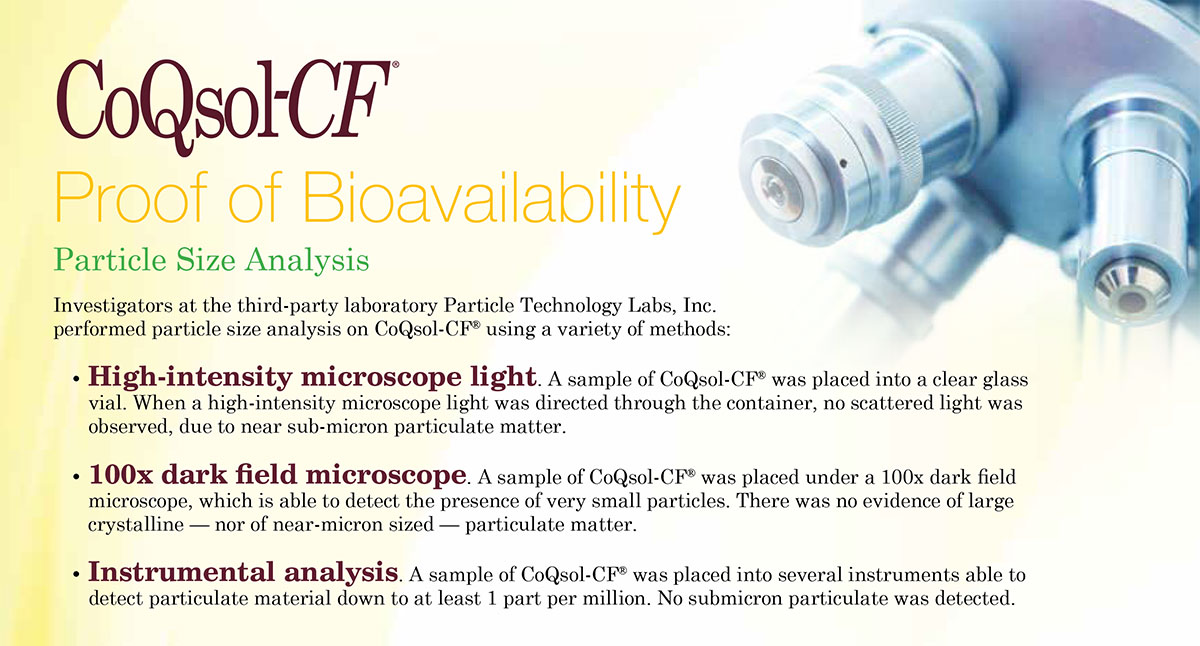
CoQsol-CF Proof of Bioavailability
Based on this, plain old crystalline CoQ10 is not a great choice for supplementation, as it has at least two major factors limiting its bioavailability. This is very unfortunate as most CoQ10 supplements on the market are simply crystalline CoQ10 pressed into tablets or loaded into capsules. From the data on absorption mechanisms on CoQ10, it is highly unlikely that we can achieve adequate serum levels of CoQ10 by supplementing with crystalline CoQ10. This means that many regular off-the-shelf CoQ10 products like that ones found in your local grocery store will likely have a hard time truly producing the CoQ10 benefits that people take it for.
The Solution to CoQ10 Absorption Bioavailability

The solution to the problem outlined above is literally to put Coenzyme Q10 in a solution (no pun intended), which is exactly what Soft Gel Technologies achieved with their CoQsol-CF product. Soft Gel Technologies discovered that CoQ10 is highly soluble in an extract of oranges called D-limonene. D-limonene can completely solubilize CoQ10, and has a Log P value of 4.570 which is below the Lipinski prescribed value of 5! By dissolving CoQ10 in D-limonene, CoQ10 bioavailability is drastically increased. Another unique aspect of D-limonene is that it inhibits recrystallization of CoQ10, which ensures both potency and stability for long stretches of time. D-limonene is much more than just a solubilizing agent for CoQ10 though, as it even has some of its own unique benefits! D-limonene benefits include:
- D-limonene has been shown to produce calming effects, which can help promote healthy levels of stress.
- D-limonene has been shown to help support our immune function.
Overall, taking into account the above D-limonene benefits, D-limonene appears to be a very healthy compound! Read on to learn more about what makes CoQsol-CF CoQ10 Softgels the best CoQ10 supplement available..
Buy CoQsol-CF CoQ10 Softgels
Vitamin E as a Coenzyme Q10 Enhancer
Not only is CoQsol-CF more bioavailable than most Coenzyme Q10 products on the market, it also features vitamin E for enhanced functioning of CoQ10 in the body. Vitamin E and CoQ10 appear to synergize together and can enhance each other’s effects in the body. At a dose of 100 IU vitamin E present in each CoQsol-CF capsule, you are getting 333% of your daily recommended intake of vitamin E! Vitamin E is important for our body and goes hand in hand with CoQ10 to help promote cardiovascular health. Vitamin E benefits are plentiful, much like D Limonene! Vitamin E benefits include:
- Vitamin E is one of many oxidative support vitamins, and helps protect from oxidative substances in the body.
- Vitamin E as been shown to help keep our immune system strong.
- Vitamin E has been shown help promote healthy cardiovascular function.
- Vitamin E has been shown to support our brains from excess glutamate.
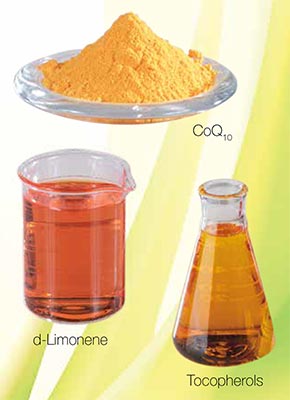
In order to fully realize these vitamin E benefits, CoQsol-CF utilizes a mixture of various tocopherols. The tocopherols included in CoQsol-CF are:
- Alpha Tocopherol in the form of d-alpha tocopherol
- Gamma tocopherol in the form of d-gamma tocopherol
- Beta tocopherol in the form of d-beta tocopherol
- Delta tocopherol in the form of d-delta tocopherol
By using mixed tocopherols, the vitamin E content in CoQsol-CF is highly bioavailable. Judging by the vitamin E benefits above, it seems that CoQsol-CF is much more than just a bioavailable CoQ10 supplement, and instead is a fairly comprehensive overall health booster!
Ubiquinol vs. Ubiquinone
Coenzyme Q10 can occur in multiple different forms in the body, and the two most abundant forms are oxidized CoQ10 (ubiquinone) and reduced CoQ10 (ubiquinol). Many people tend to prefer ubiquinol, due to its oxidation reducing effects in the body. However, due to this, the lesser desired ubiquinone often times gets overlooked. This is a shame because it actually has some very unique effects! Ubiquinone plays a major role in the electron transport chain, acting as a shuttle for cellular energy. Due to the fact that ubiquinone CoQ10 is hydrophobic and lipophilic, it can freely move between hydrophobic regions in the inner membranes of mitochondrion. It moves by way of passive diffusion, so no energy is needed to move CoQ10 around in the mitochondrion.
Ubiquinone stores energy temporarily, and is able to move it through the electron transport chain. It does this by attaching an electron to its benzoquinone head. It can accept electrons from various different systems, such as NADH-Q reductase. Ubiquinone transports these electrons from complex I and complex II of the electron transport chain, to complex III of the electron transport chain. While it does this, it also transports protons, which generates a proton gradient across the inner mitochondrial membrane. As these protons flow back across the inner mitochondrial membrane, it directly helps form adenosine triphosphate (ATP). This is in addition to ubiquinone already enhancing ATP synthesis by transporting electrons throughout the electron transport chain.
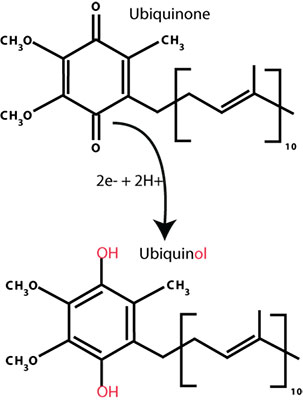
ATP is the primary source of energy for our cells, and nearly every biological process in our body is dependent on the availability of ATP. You can read more about the importance of ATP in our in-depth creatine blog. Since CoQ10 is such an important component in ATP synthesis, deficiencies in CoQ10 can be majorly detrimental to various different functions within our bodies and brain. By supplementing with CoQ10, especially in the ubiquinone form, we can enhance ATP formation; which should translate to improved physical strength and enhanced cognition. To capitalize on the effects of CoQ10, it may be highly beneficial to take CoQ10 alongside creatine monohydrate. As can be read in the creatine monohydrate blog, creatine is another major regulator of ATP production, and it has been suggested that CoQ10 and creatine synergize to produce large amounts of ATP.
Stacking CoQ10 and Shilajit Supplements
Another good product to combine with CoQ10 is shilajit. Studies have shown that when CoQ10 and shilajit are supplemented together mitochondrial function is improved greater than with either one alone. Shilajit essentially improves the efficiency of the supplemented CoQ10. The combination of shilajit and CoQ10 has been shown to significantly elevate levels of ATP in the body. The reason for this is the fulvic acid and humic acids that are found in shilajit. Fulvic acid makes mitochondrial energy extraction more efficient, where humic acid speeds up the transfer of electrons along the electron transport chain. Put together, these mechanisms combine with the mitochondrial enhancing effects of CoQ10 to provide a very significant improvement to your body's entire energy transfer system. So combining CoQSol-Cf with our Primavie shilajit is a great combination that one should consider for energy and mitochondrial support.
What Does Ubiquinol Do?
As mentioned earlier, many people appear to prefer the fully reduced form of Coenzyme Q10, ubiquinol. Why is this the case? In the body, and especially in mitochondrion, ubiquinol benefits are focused on directly reducing oxidation. This is highly important in mitochondrion as their high activity results in large amounts of oxidative stress. By supplementing with ubiquinol CoQ10, it is possible to directly reduce oxidation in targeted areas such as the mitochondrion. These ubiquinol benefits make it highly attractive to consumers, and for good reason, as these oxidation reducing ubiquinol benefits are very desirable! That being said, you do not necessarily have to directly supplement with ubiquinol in order to utilize ubiquinol's benefits. This is due to the fact that ubiquinone actually turns into ubiquinol as it travels through the electron transport chain. In the electron transport chain, CoQ10 exists in three forms: ubiquinone, semiquinone and ubiquinol. Ubiquinone is the fully oxidized form, and when it picks up a proton, it turns into the partially reduced form, semiquinone. Semiquinone is a highly unstable compound which is quickly further reduced to ubiquinol by picking up another proton. Ubiquinol may then act in an oxidative support role in the mitochondria. However, when ubiquinol interacts with an oxidant, it becomes oxidized and loses a proton. This turns ubiquinol back into semiquinone. Semiquinone then also becomes oxidized and now we are back at the fully oxidized form of CoQ10: ubiquinone. This means that by either supplementing with ubiquinone or ubiquinol, you will reap similar benefits. That being said, supplementation of ubiquinone may act more rapidly to produce ATP whereas supplementation with ubiquinol may act more rapidly to control oxidative stress in the mitochondria.
Who Should Take a CoQ10 Supplement?
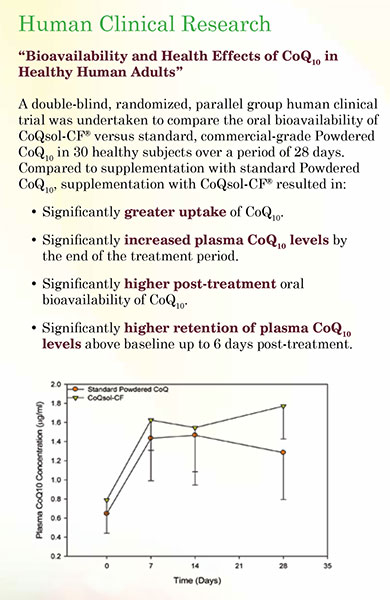
|
Anybody looking to enhance cellular health via a CoQ10 supplement should consider supplementing with CoQsol-CF. On an anecdotal level, Coenzyme Q10 has helped many of us around the office sustain energy levels, aid in exercise performance, increase mental clarity, and promote mood. On a scientific level, the combination of CoQ10 and creatine monohydrate will produce lots of ATP to keep our cells running at optimal capacity! In particular, if you are interested in supplementing with CoQ10, we would highly recommend CoQsol-CF over most commonly available CoQ10 supplements. Again, as mentioned earlier, this is due to the fact that CoQsol-CF is highly bioavailable in comparison to other CoQ10 supplements on the market. All of the CoQ10 benefits can only be fully realized and implemented if the CoQ10 is actually being absorbed! Learn more about the clinical research regarding the biovailability of CoqSol-CF CoQ10 Softgels in the diagram to the left. |
View more Nootropics Depot blog articles by clicking the links below:
The Best Supplements to Support Collagen Synthesis and Skin Health
Ashwagandha Benefits: An Ayuverdic Herb For Stress Support, Immune Health, and Restful Sleep
The Top 5 Milk Thistle Health Benefits
A Closer Look At The Top 5 Taurine Benefits
Melatonin Supplements: Did You Know This Popular Over The Counter Sleep Aid Is Often Overdosed?
How To Boost Your Immune System With The Top 5 Immune Supplements
Nootropics Depot's Guide to the Top 10 Natural Nootropics of 2018
EpiCor Immune Health: The Natural Immune Booster Supplement You May Not Know About
Nigella Sativa: The Top Health Benefits of Black Seed Oil Extract
Magnesium Glcyinate vs. L-Threonate: Which Is The Best Magnesium Supplement?
Cognizin Citicoline: A Choline Supplement That Supports Healthy Brain Function
7,8-Dihydroxyflavone: A Brain Health Supplement That May Support Neuroplasticity
Creatine: A Nootropic for Bodybuilders, Athletes, Vegans, Vegetarians Alike
How to Find the Best Curcumin Supplement and What to Know Before You Buy
Comparing Rhodiola rosea Extracts: Rosavins vs. Salidroside
Berberine: A Look at the Potential Benefits of this Versatile Supplement
Lion's Mane Mushroom: Comparing our 1:1: and 8:1 Extracts
Nitric Oxide Boosters Reviewed: L-Citrulline, Agmatine and AAKG
Red Reishi Mushrooms: Comparing our 1:1 and 8:1 Extracts
Comprehensive Guide to the Best Anti-Aging Supplements
Cordyceps Militaris Mushrooms: Comparing our 1:1 and 10:1 Extracts
Bacognize vs. Synapsa: Which Ayurvedic Herb is Right for You?
The Nootropic Synergy of Caffeine + L-Theanine
L-Citrulline vs. L-Citrulline DL-Malate: Which is Best?
Shilajit: A Look at this Amazing Ayurvedic Compound
The Ultimate Guide to Nootropics
Mushroom Extracts: Whole Fruiting Bodies vs. Mycelium On Grain
Teacrine: The Alternative to Caffeine
Zembrin: A Natural Way to Boost Your Mood
Ashwagandha: KSM-66 vs. Sensoril
Panax Ginseng: What You Might Not Know
Palmitoylethanolamide: Known for its Pain Reducing Qualities
Put to the Test: A Look at Nootropics Depot's Purity Testing
Browse More From Nootropics Depot



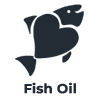
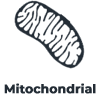



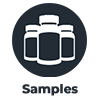
Ayurveda | Adaptogens | Amino Acids | Choline Supplements | Fitness Supplements | Immune Support | Metabolism Supplements | Mushroom Extracts | Natural Plant Extracts | Natural Nootropic Capsules | Natural Pain Support | Patented Nootropic Extracts | Sleep Support Supplements | Softgels | Solutions + Sublinguals | Enteric Coated Tablets | Nootropic Samples
Attention: These statements have not been evaluated by the Food and Drug Administration These products are not intended to diagnose, treat, cure or prevent any disease.


